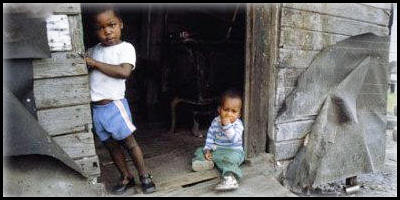-
Black History Month 2012, Part III - More A Nuisance Than A Necessity
February 14, 2012
Have an opinion? Add your comment below. In a country where access to capital is everything, most African-Americans have very little.
-
As we continue with our current series for Black History Month 2012, it's apparent that a lot of people are simply tired of hearing about the problems of African-Americans. They're got their own problems. And even though they acknowledge that our problems are ongoing and unique at times, solving them seems to be more of a nuisance than a necessity

The reality is while these problems might seem to be a nuisance, they are real. And solving them is indeed a necessity. So this time we want to take a brief look at some of the most pressing problems. They are directly tied to the current state of the economy. We begin with some not-so-surprising facts. For example, in order to benefit from our history, which is the past, we must understand and confront it. History properly taught and correctly learned can be a storehouse of great truths and invaluable experiences. We begin by sharing some facts.
Since 2000, the number of Americans living in poverty has risen to nearly 37 million. More than 13 million of these are children. More than one in four American families with children makes less than $30,000 a year. Look within that number and you find 46% of African-American families with children and 44% of Hispanic families with children fall below the mark.
Many say we shouldn't bring these facts up, that we should be content to let the government handle it. But we simply can't go down this path: If we do, the informed haves will become the "have-mores" and the "have nots" will become the "have nones."
Some in this group are convinced that what we say may be a left-wing, unpatriotic conspiracy or a right-wing editorial cabal designed to erode hard-earned civil rights and restrict women's rights. Whether or not you agree and how you feel about these issues depends largely on how they affect you.
We have become a society that steadfastly refuses to draw upon history until presented with a crisis that jolts our memory and brings us face-to-face with our past. In the 1970s large enclaves of African-Americans, poor and middle class in major markets such as Los Angeles, Detroit, Washington, Chicago and other cities, found themselves marginalized and surrounded by affluence to the level of decadence. These frustrated citizens, most of whom were law-abiding, used the death of Dr. Martin Luther King Jr. and police brutality as excuses to self-destruct and ignite conflagrations seen and heard around the world.
Despite high-profile success stories, the typical black family is poorer by some standards today than it was nearly 30 years ago. In a country where access to capital is everything, most African-Americans have very little.
Naturally, part of the story of the current recession is a one about jobs. The unemployment rate for most demographic groups essentially doubled during the recession, according to the Bureau of Labor Statistics. For African-Americans, the jobless rate rose from 7.7% to 16.5%, while the jobless rate for whites went from 3.9% to 8.3%.
Those disparities in employment are well known. What's not fully appreciated is how deeply the recession cut into the incomes of Black households and how the recession devastated the wealth of Black families.
In this chapter in our current series for Black History Month 2012, we don't want to just dwell on the negatives. We also want to look positively on the progress that's been made in spite of the obstacles that had to be overcome. Given the economic and social structure of how poverty reproduces itself, these programs are an unfolding cataclysm for minorities.
America Is Still Divided – Ignorance, Not Hate, Separates Us
Segregation today has little to do with hate and much to do with ignorance. Segregation in 2012 is no longer automatically equated with racism, either by race relations experts or the many black and white homeowners who continue to live separately. Most whites are not racists, says University of Michigan sociologist Reynolds Farley. At the same time, there continues to be a strong undercurrent of traditional negative stereotypes. It's not conscious prejudice, but part of our culture. Subtle perceptions shade decisions on where to live, reinforcing racial divide.

Segregation in the 21st century doesn't involve restrictive covenants or cross burnings or, in most cases, even conscious intentions. Yet the reasons often cited are shaded by perceptions of those with different skin color. Those perceptions are part true, part myth, part legacy and stem from a time when racism was rampant. The answer and solution lies partly in history and partly in culture -- and both are related to race. For example, people tend to feel more comfortable around those with whom they have a shared culture and background. Whether you're black or white, you want to maximize happiness for you and your family. You want good schools and a nice house, but there's also something to be said for neighbors you can relate to.
Communities built from scratch tend to be more open to diversity. There are lots of new neighborhoods that don't have the reputation of being either all-black or all-white. Regions with small black populations tend to be less segregated. Of the nation's five least-segregated metro areas, none is more than 3% black. There's also a connection, although not as strong, between lower segregation and the presence of a third large minority. Where attention is not entirely focused on the history of black-white relations that makes a difference. Still other regions have similar traits and have still become less racially divided.
Metropolitan Pittsburgh, for example, lost population in the 1990's, while Detroit gained 4%. Yet the level of segregation is 22% higher in Detroit. Metro Atlanta has a larger black population than Detroit, yet segregation is 34% higher.
Since this is an important election year, let's take a brief look at some sad political history. Some of you may remember in Florida just before the 2000 elections. Governor Jeb Bush's administration purged some 57,700 voters, a disproportionate number of whom were black, from the voting rolls for allegedly being felons. Because many of the voters weren't felons, the NAACP and other organizations decried the move as racist.
If this all sounds excruciatingly familiar, like a broken record, it's because, in many ways, it is. We have heard these refrains many times before and, because we have not properly learned from history, we will hear them again and again.
What have we learned from history? Black History Month 2012 is another historical month in a year in which it appears that America must enjoy making the angels cry. However, it must not be politicized in such a manner that the voices of change and reason are drowned out.
While unawareness was once seen as the most serious barrier to newfound pride and to easing the racial crisis, well-meaning whites could not shed a paternalist attitude toward blacks. During the many activities of the '70s and '80s, being black became a new religion and converts were made when the search for identity resulted in discovery. The walls of caste came down, at least inside black America, and the marks of bondage became articles of sacrament. African-Americans began to talk to other African-Americans about the food they ate, the music they liked and even about the rhythms of their walk. For the black activists and Muslims, responsibility was preparing for Armageddon. For others, less fatalistic or more naïve, responsibility riveted them to the here and now. Some who left the ghetto were heading back. A few had "found" themselves, and a lot who claimed they had, were still looking. Ghetto issues became more crucial and targets of oppression got bigger. Blacks began to raise hell about who taught what to black children and if Black History wasn't included then even the children got pummeled in fractious debates.

That was then and this is now. It's 2012.Time to push back against racism, lies and deceit. We cannot remain silent any longer. African-Americans must prepare to enjoy and be a part of the next post-racial America … to do that we need to work on developing our peripheral vision. Is that lightning we see off in the distance? And is that also thunder that we feel? And is that thunder and lightning more a nuisance than a necessity? Is the rainbow that follows a symbol of something brand new and timeless – something inherently unique? And finally, we must not let the seeds prevent us from enjoying the watermelon.
Word.
(Next Week The Conclusion - Part IV. Of Black History Month 2012)
-
-
